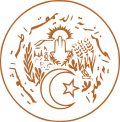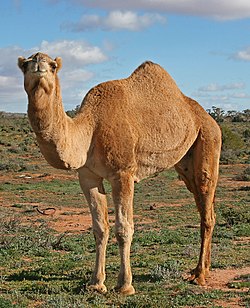Portal:Africa



Africa is the world's second-largest and second-most populous continent after Asia. At about 30.3 million km2 (11.7 million square miles) including adjacent islands, it covers 20% of Earth's land area and 6% of its total surface area. With nearly 1.4 billion people as of 2021, it accounts for about 18% of the world's human population. Africa's population is the youngest among all the continents; the median age in 2012 was 19.7, when the worldwide median age was 30.4. Based on 2024 projections, Africa's population will exceed 3.8 billion people by 2100. Africa is the least wealthy inhabited continent per capita and second-least wealthy by total wealth, ahead of Oceania. Scholars have attributed this to different factors including geography, climate, corruption, colonialism, the Cold War, and neocolonialism. Despite this low concentration of wealth, recent economic expansion and a large and young population make Africa an important economic market in the broader global context, and Africa has a large quantity of natural resources.
Africa is highly biodiverse; it is the continent with the largest number of megafauna species, as it was least affected by the extinction of the Pleistocene megafauna. However, Africa is also heavily affected by a wide range of environmental issues, including desertification, deforestation, water scarcity, and pollution. These entrenched environmental concerns are expected to worsen as climate change impacts Africa. The UN Intergovernmental Panel on Climate Change has identified Africa as the continent most vulnerable to climate change.
The history of Africa is long, complex, and varied, and has often been under-appreciated by the global historical community. In African societies the oral word is revered, and they have generally recorded their history via oral tradition, which has led anthropologists to term them "oral civilisations", contrasted with "literate civilisations" which pride the written word. African culture is rich and diverse both within and between the continent's regions, encompassing art, cuisine, music and dance, religion, and dress.
Africa, particularly Eastern Africa, is widely accepted to be the place of origin of humans and the Hominidae clade, also known as the great apes. The earliest hominids and their ancestors have been dated to around 7 million years ago, and Homo sapiens (modern human) are believed to have originated in Africa 350,000 to 260,000 years ago. In the 4th and 3rd millennia BCE Ancient Egypt, Kerma, Punt, and the Tichitt Tradition emerged in North, East and West Africa, while from 3000 BCE to 500 CE the Bantu expansion swept from modern-day Cameroon through Central, East, and Southern Africa, displacing or absorbing groups such as the Khoisan and Pygmies. Some African empires include Wagadu, Mali, Songhai, Sokoto, Ife, Benin, Asante, the Fatimids, Almoravids, Almohads, Ayyubids, Mamluks, Kongo, Mwene Muji, Luba, Lunda, Kitara, Aksum, Ethiopia, Adal, Ajuran, Kilwa, Sakalava, Imerina, Maravi, Mutapa, Rozvi, Mthwakazi, and Zulu. Despite the predominance of states, many societies were heterarchical and stateless. Slave trades created various diasporas, especially in the Americas. From the late 19th century to early 20th century, driven by the Second Industrial Revolution, most of Africa was rapidly conquered and colonised by European nations, save for Ethiopia and Liberia. European rule had significant impacts on Africa's societies, and colonies were maintained for the purpose of economic exploitation and extraction of natural resources. Most present states emerged from a process of decolonisation following World War II, and established the Organisation of African Unity in 1963, the predecessor to the African Union. The nascent countries decided to keep their colonial borders, with traditional power structures used in governance to varying degrees. (Full article...)
Selected article –

Lalibela (Amharic: ላሊበላ, romanized: Lalibäla) is a town in the Amhara Region of Ethiopia. Located in the Lasta district and North Wollo Zone, it is a tourist site for its famous rock-cut monolithic churches designed in contrast to the earlier monolithic churches in Ethiopia. The whole of Lalibela is a large and important site for the antiquity, medieval, and post-medieval civilization of Ethiopia. To Christians, Lalibela is one of Ethiopia's holiest cities, and a center of pilgrimage.
Ethiopia was one of the earliest nations to adopt Christianity in the first half of the 4th century, and its historical roots date to the time of the Apostles. The churches themselves date from the 7th to 13th centuries, and are traditionally dated to the reign of the Zagwe (Agaw) king Gebre Meskel Lalibela (r. c. 1181–1221). (Full article...)
Featured pictures –
Did you know (auto-generated) -

- ... that actress Dorothy Van Engle starred in the 1935 movie Murder in Harlem with a "proto-feminist role" that was then a primary source of positive representation for African Americans in film?
- ... that the Shady Rest Golf and Country Club was the home of John Shippen, the first African American to compete in the U.S. Open?
- ... that Michigan defensive end Eyabi Okie, ranked number 3 in the 2018 college football recruiting class, changed his surname from "Anoma" to recognize his mother who lives in Africa?
- ... that the son of an engine fitter from England became Director of Education in part of modern-day South Africa for almost twenty years?
- ... that British communist leader Trevor Carter was the stage manager for the first British-Caribbean carnival, held in St Pancras Town Hall?
- ... that in 2019 the South African army's Natal Carbineers were renamed the Ingobamakhosi Carbineers, after a Zulu regiment that had fought against them at the 1879 Battle of Isandlwana?
Categories
Selected biography –
Shambel Abebe Bikila (Amharic: ሻምበል አበበ ቢቂላ; August 7, 1932 – October 25, 1973) was an Ethiopian marathon runner who was a back-to-back Olympic marathon champion. He was the first Ethiopian Olympic gold medalist, winning his first gold medal at the 1960 Summer Olympics in Rome while running barefoot. At the 1964 Tokyo Olympics, he won his second gold medal, making him the first athlete to successfully defend an Olympic marathon title. In both victories, he ran in world record time.
Born in Shewa, Abebe moved to Addis Ababa around 1952 and joined the 5th Infantry Regiment of the Ethiopian Imperial Guard, an elite infantry division that safeguarded the emperor of Ethiopia. Abebe served in the Kagnew Battalion during the Korean War. (Full article...)
Selected country –
 |
 |
|

| ||
Algeria (Arabic: الجزائر, Al Jaza'ir, Berber: ![]() , Dzayer [ldzæjər]), officially the People's Democratic Republic of Algeria, is the second largest country on the African continent. It is bordered by Tunisia in the northeast, Libya in the east, Niger in the southeast, Mali and Mauritania in the southwest, and Morocco and Western Sahara in the west.
, Dzayer [ldzæjər]), officially the People's Democratic Republic of Algeria, is the second largest country on the African continent. It is bordered by Tunisia in the northeast, Libya in the east, Niger in the southeast, Mali and Mauritania in the southwest, and Morocco and Western Sahara in the west.
Algeria is a member of the United Nations, African Union, Arab League and OPEC. Constitutionally, Algeria is defined as an Islamic, Arab, and Amazigh (Berber) country.
The name Algeria is derived from the name of the city of Algiers, from the Arabic word al-jazā’ir, which translates as the islands, referring to the four islands which lay off the city's coast until becoming part of the mainland in 1525. Al-jazā’ir is itself a truncated form of the city's older name jazā’ir banī mazghannā, "the jazeera of (the tribe) Bani Mazghanna", used by early medieval geographers such as al-Idrisi and Yaqut al-Hamawi. (Read more...)
Selected city –
Alexandria (/ˌælɪɡˈzændriə, -ˈzɑːn-/ AL-ig-ZA(H)N-dree-ə; Arabic: الإسكندرية;) is the second largest city in Egypt and the largest city on the Mediterranean coast. It lies at the western edge of the Nile River delta. Founded in 331 BC by Alexander the Great, Alexandria grew rapidly and became a major centre of Hellenic civilisation, eventually replacing Memphis, in present-day Greater Cairo, as Egypt's capital. Called the "Bride of the Mediterranean" and "Pearl of the Mediterranean Coast" internationally, Alexandria is a popular tourist destination and an important industrial centre due to its natural gas and oil pipelines from Suez.
The city extends about 40 km (25 mi) along the northern coast of Egypt and is the largest city on the Mediterranean, the second-largest in Egypt (after Cairo), the fourth-largest city in the Arab world, the ninth-largest city in Africa, and the ninth-largest urban area in Africa. (Full article...)
In the news
- 28 April 2025 – Red Sea crisis
- According to the Houthis, 68 people are killed and 47 others are injured in a U.S. airstrike on a prison holding African migrants in Saada Governorate, Yemen. (CTV News)
- 27 April 2025 – Sudanese civil war
- Rapid Support Forces militants kill over 31 civilians, including minors, in a mass shooting near al-Salha, Omdurman. (Sudan Tribune)
- 26 April 2025 – Islamist insurgency in the Sahel
- Twelve soldiers are killed in clashes with militants near the village of Sakoira, Niger. (Reuters)
- 24 April 2025 – Somali Civil War
- Al-Shabaab militants seize the town of Wargaadhi and its military base in Middle Shabelle, Somalia. More than 40 militants and twelve clan fighters are killed in related combat. (Al Jazeera)
- 24 April 2025 – Islamist insurgency in the Sahel
- The Beninese government announces that 54 soldiers were killed in an attack by Jama'at Nasr al-Islam wal Muslimin (JNIM) in the north of the country last week, after previously announcing only eight soldiers were killed. JNIM claims 70 soldiers were killed in the attack. (BBC News)
- 22 April 2025 –
- Interpol rescues 33 West Africans, including people from Benin, Togo, Burkina Faso, and Ghana, from human trafficking rings in the Ivory Coast. (AP)
Updated: 18:05, 28 April 2025
General images -
Africa topics
More did you know –

- ...that the 1459 Fra Mauro map (pictured) reports that "a junk from India" rounded the Cape of Good Hope in 1420, around 70 years before the navigations of Vasco da Gama?
- ...that the 1998 Sudan famine was caused by human rights abuses in the midst of the Second Sudanese Civil War?
- ...that a smokie is a West African delicacy made by blowtorching the carcass of a sheep or goat without removing its fleece?
- ...that Anne-Marie Nzié, a Cameroonian bikutsi singer, dedicated the song Liberté to President Paul Biya and his party, the Cameroon People's Democratic Movement?
Related portals
Major Religions in Africa
North Africa
West Africa
Central Africa
East Africa
Southern Africa
Associated Wikimedia
The following Wikimedia Foundation sister projects provide more on this subject:
-
Commons
Free media repository -
Wikibooks
Free textbooks and manuals -
Wikidata
Free knowledge base -
Wikinews
Free-content news -
Wikiquote
Collection of quotations -
Wikisource
Free-content library -
Wikispecies
Directory of species -
Wikiversity
Free learning tools -
Wikivoyage
Free travel guide -
Wiktionary
Dictionary and thesaurus



























































































